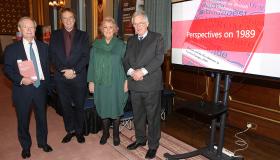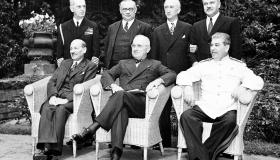News: FCDO Historians
Information, News and Events from the Foreign, Commonwealth and Development Office Historians

Launch of the latest volume of Documents on British Policy Overseas: Series III, Volume XII: Britain and the Revolutions in Eastern Europe, 1989
On the 30th anniversary of the fall of the Iron Curtain FCO Historians launched a new volume of Documents on British Policy Overseas, the official documentary record of British foreign policy since 1945, covering the Government’s response to the social and political changes in Eastern Europe during 1989. With material from FCO, Cabinet Office and No. 10 files the volume charts events in Bulgaria, Czechoslovakia, the GDR, Hungary, Poland and Romania, and looks briefly at British policy towards the Baltic States. It contains reporting from British embassies on the rapidly changing political scene, and follows attempts to develop policy against the backdrop of unfolding revolution.
The volume is complemented by oral testimony from British diplomats in a witness seminar organised by the Institute for Commonwealth Studies, King’s College, London and the FCO. The transcript entitled, ‘British Embassies and the East European Revolutions of 1988-89’ can be found online.
An international perspective on the fall of the Berlin Wall and unification of Germany can be found in When the Wall Came Down, which brings together diplomatic documents from 11 countries. Compiled by the International Committee of Editors of Diplomatic Documents this freely available book contains documents from the UK, along with Austria, Canada, Germany, Israel, the Netherlands, Poland, Russia, Switzerland, Turkey and the USA. It is available here.
New historical resource for understanding the Lancaster House Conference of 1979
The Lancaster House Agreement was signed on 21 December 1979. Marking the culmination of nearly three months of intensive negotiations, the Agreement brought an end to the illegal white-dominated regime that had ruled Rhodesia since the Unilateral Declaration of Independence in 1965 and a bitter civil war, marked by increasing brutality on all sides.
Lancaster House represented an early diplomatic success for the Conservative government of Margaret Thatcher that had come to power in May 1979. It remains one of the most notable achievements of British diplomacy in the modern era: a tribute to the effectiveness of Foreign Secretary Lord Carrington and his team.
In July 2005 a witness seminar was held at the National Archives, Kew, under the auspices of the Centre for Contemporary British History (CCBH) and the London School of Economics (LSE). Organised by Dr Sue Onslow (then of LSE) and Dr Michael Kandiah (then of the CCBH), it brought together leading participants in the Lancaster House conference. Since several important participants were unable to attend the witness seminar, Dr Onslow and Dr Kandiah conducted a series of interviews with them in the course of 2005-6.
Both the witness seminar and the interviews represent a major historical resource for understanding both Lancaster House and the complex, frustrating negotiations that preceded it. Until now, however, only the former document had been publicly available. FCO Historians were therefore delighted to mark the 40th anniversary of the Lancaster House conference by republishing the transcript of the witness seminar, and publishing for the first time the transcripts of the subsequent interviews. We are grateful to Dr Onslow and Dr Kandiah for permission to publish them, as well as for undertaking further editorial work to bring them up to date. They are available online.

Potsdam Conference anniversary marked with new publication
To mark the 75th anniversary of the last great conference of the Second World War, FCO Historians have published a collection of documents: Britain and the making of the Post-War World: the Potsdam conference and beyond. The publication, edited by Gill Bennett and Richard Smith, draws on documents from eight volumes of Documents on British Policy Overseas and includes previously unpublished intelligence material. It is freely available online at or on Amazon for £5.99 (for those who prefer a hard copy).
You can see Gill Bennett, discuss events at Potsdam and Britain’s place in the immediate post-war world in conversation with Chief Historian Patrick Salmon on the FCO YouTube Channel.
All the major issues confronting the post-war world were raised at the Potsdam Conference. For victors and vanquished alike, the realities of political, economic and demographic dislocation, as well as a change in the balance of global power, became brutally clear. The conference represented a doorway between the old world and the new. The documents in this volume, from July to December 1945, provide a vivid snapshot of the complex legacy of six years of war.
The collection contains real insights into the challenges facing the British government. Firstly, Britain’s place in the post-war world, including its economic predicament, global obligations and relations with the Dominions and Commonwealth. Secondly, its relations with the United States, tight-knit during the war but now strained by economic disparity and by disagreements over atomic know-how and global commerce. Finally, British policy towards the Soviet Union, which had ensured Allied victory, but whose future intentions remained worryingly uncertain.
A Class of its Own? Social Class and the Foreign Office, 1782-2020
In March, FCO Historians published the last of their studies into diversity at the Foreign Office with an Occasional Paper looking at the history of class. Using archival documents and oral interviews, James Southern tells the story of the complex relationship between social class and British diplomacy. From the nineteenth-century era when diplomacy was described as 'outdoor relief for the aristocracy', through to the post-1945 'age of meritocracy' and beyond - up to the present day, when class, or 'socioeconomic background' is high on the FCO's Diversity & Inclusion agenda. It is freely available online, along with other studies into gender, sexuality and race.